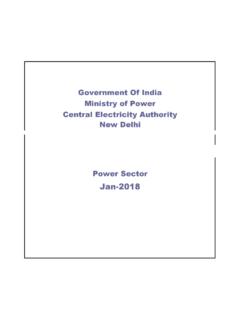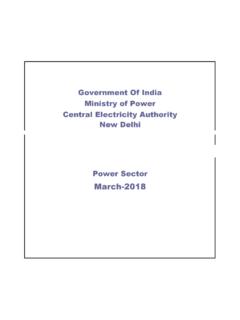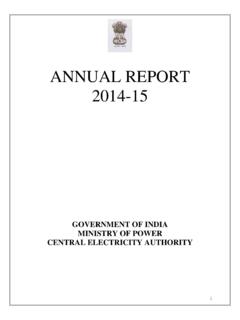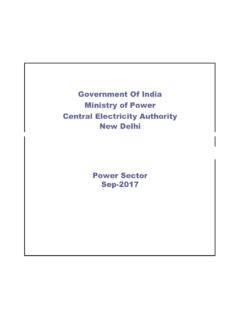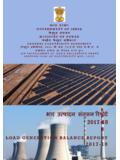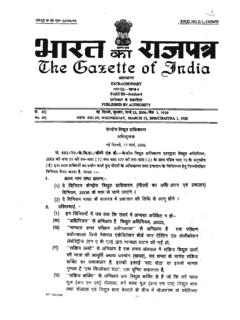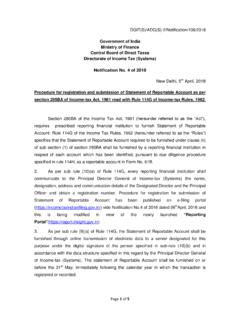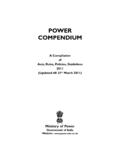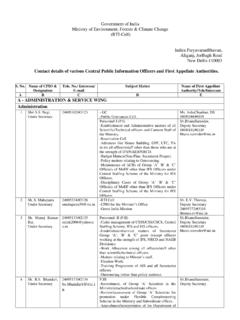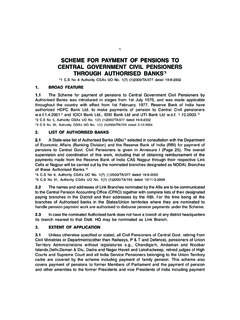Transcription of Ministry of Power Govt. of India - CEA
1 NATIONAL TRAINING POLICY FOR THE Power SECTOR JUNE 2002 Ministry of Power Govt. of India Shram Shakti Bhawan , Rafi Marg, New Delhi-110001 Page: i government of India Ministry of Power Shram Shakti Bhawan New Delhi the 7th June, 2002 RESOLUTION Sub: National Training Policy for the Power Sector of India Considering that the need for training has acquired critical importance in the context of the rapid technological changes as well as social transformation taking place in the country in general and Power sector in particular, the government feels that it is necessary to develop a dynamic training policy in consonance with the changing business context to achieve higher productivity and customer satisfaction.
2 Accordingly, a Standing Committee on training was constituted to bring into focus, the need to step up training and human resource development, create an orientation of Power sector personnel and stake holders towards the urgency and need for reforms and energy conservation as well as provide a standing join forum for coordination of training related matters in the Power sector. The said committee, held extensive deliberations and consultations and organized a National level seminar attended by the Chief Executive Officers and Heads of HRD of Central, State and Private Power utilities, academic institutions and Central/State Electricity Regulatory Commissions to draw up a comprehensive training policy.
3 Three Zonal meetings were also conducted at Bangalore, Nagpur and Guwahati to present the strategy and action plan before the Power generators, distributors and other stakeholders for eliciting their views. Page: ii The final report of the committee devising a training strategy and time bound action plan for its implementation submitted to the government is annexed. The government accepts the recommendations of the committee and resolves to adopt the same through the active involvement of all the organizations in the Power sector in India .
4 The implementation of the training policy will be monitored by the Standing Committee on Training quarterly. Sd/- ( Suvrathan) Joint Secretary to the government of India Copy for information and necessary action to: 1. The Chairman, Central Electricity Authority of India . 2. The Chairmen, Central & State Electricity Regulatory Commissions 3. The Chairmen, State Electricity Boards, 4. The Chief Executives of all Central, State government PSUs and Private Sector Power Utilities of India 5. Heads of all Training Institutes of Power Sector 6. PS to MOP 7. PS to MOS(P) 8. PS to Secretary ( Power ) 9.
5 PS to SS ( Power ) 10. AS (P), JS (Hydel), JS (Dist.), JS (T&R), JS (F&A) 11. All Directors & Deputy Secretaries in the Ministry of Power 12. All Under Secretaries/Desk Officers/Section Officers in the MOP. Page: iii NATIONAL TRAINING POLICY FOR THE Power SECTOR CONTENTS Page No. PREAMBLE 1 NEED FOR A TRAINING POLICY 3 STANDING COMMITTEE ON TRAINING IN Power SECTOR 4 METHODOLOGY 5 THE PRESENT STATUS OF TRAINING AND 8 THE AREAS OF CONCERN POLICY GUIDELINES 17 IMPLEMENTATION STRATEGY 27 FUNDING 34 MARKETING TRAINING 35 LOOKING AHEAD 36 ANNEXURES 37 Page.
6 1 Preamble The main objective of electricity industry is to achieve customer satisfaction through generation of electricity of the right quality and quantity at an affordable cost and supply to the consumers efficiently whenever and wherever required. This involves planning, design, engineering, procurement, handling and storing, construction, commissioning, operation and maintenance of Power plants, equipment, transmission and distribution, sale of energy and collection of revenue, management of personnel and finance etc.
7 , each a critical task in its own right. Trained manpower is required at every stage of the above mentioned tasks. Fast advancement of technology is making every sphere of the electricity supply industry more and more sophisticated, requiring specially skilled engineers, supervisors, artisans, managers etc. to manage the industry. The growing concern over environmental degradation and depletion of the conventional energy sources has made the task more challenging. The technical knowledge acquired from engineering colleges, polytechnics, industrial training institutes and other technical institutions needs to be supplemented with applied engineering and managerial skills.
8 These skills are to be regularly updated to cope with the ever progressing and rapidly advancing technologies being introduced in the Power sector where the speed of obsolescence often overtakes the pace of acquisition of a particular skill Due to the introduction of more sophisticated technology and automation, the Man/MW ratio is declining. The Man/MW ratio in thermal sector in India has declined from in the Sixth plan to less than in the Ninth plan. In the hydro sector too, the Man/MW ratio has come down from in the Sixth plan to in the Ninth plan.
9 The same trend is evident in terms of the number of personnel/ million units supplied - declining from in 1992-93 to in 2000-2001, a 45% decrease in eight years. Page: 2 This indicates the increasing importance of each individual, which in turn makes manpower quality criteria more demanding. Added to this is the fact that electricity industry is a highly capital intensive industry. This necessitates the operation of the plants and equipment in the most safe and efficient manner to minimise the cost of supply. Power sector reforms in India have gained momentum with the initiative of most of the State Governments in establishing State Electricity Regulatory Commissions (SERC) and restructuring the SEBs.
10 The reforms are expected to change the way the Indian Electricity Supply Industry has been functioning for the last five decades and therefore demands major changes in the roles of technical/managerial personnel at various levels. As Power sector reforms involve a number of complex and intricate issues, the people involved will need to be equipped with specific inputs in terms of knowledge, skills and attitude to enable them to play their changed roles effectively. This policy document is expected to help the stakeholders concerned in discharging the training responsibilities in a more effective manner.
